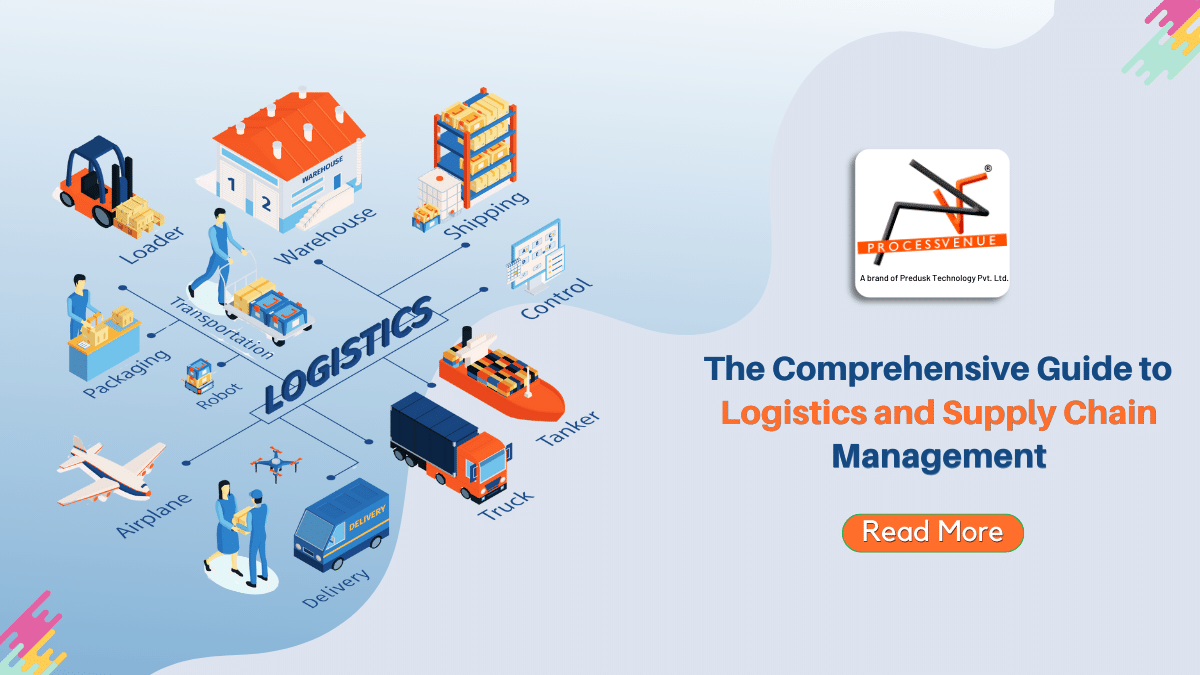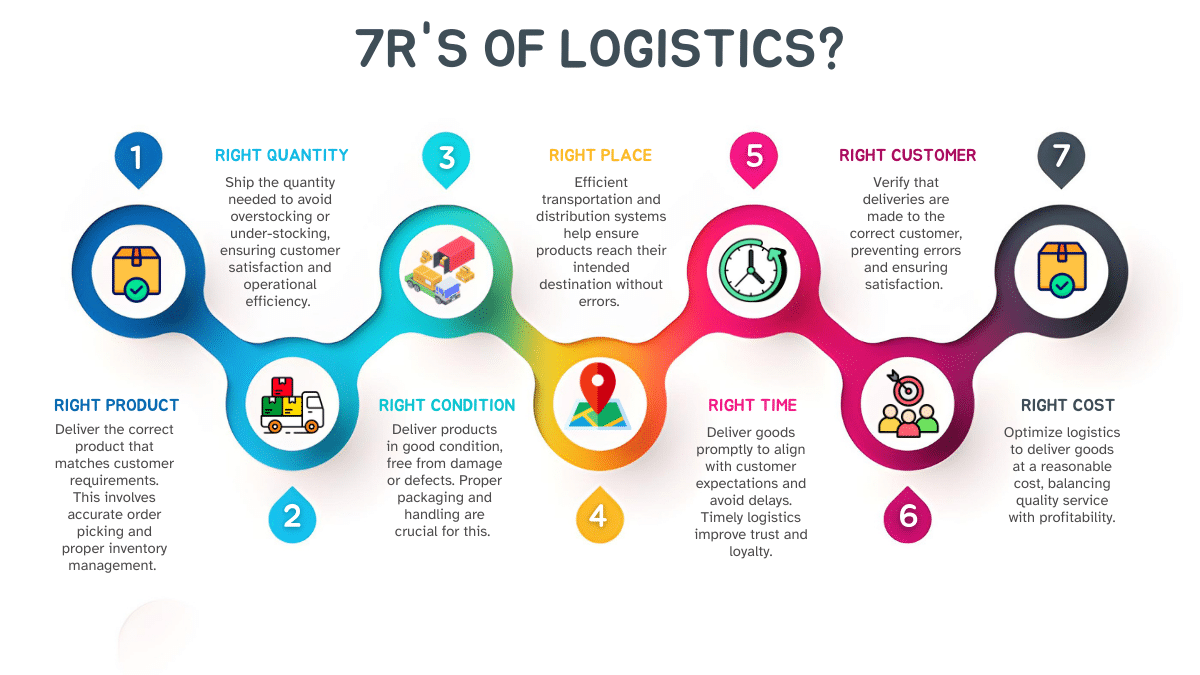
The Comprehensive Guide to Logistics and Supply Chain Management
Logistics and supply chain management play critical roles in the smooth flow of goods from suppliers to consumers. They involve coordinating processes like inventory management, transportation, and demand forecasting. Effective supply chain management allows companies to operate efficiently, meet market demands, and maintain a competitive edge. Read on to learn more!
Introduction to Logistics and Supply Chain Management
Logistics and supply chain management involves coordinating the flow of goods, information, and services from suppliers to customers. It covers everything from sourcing raw materials to delivering finished products. Effective management of these processes helps businesses operate smoothly and meet customer expectations.
Why It Matters for Businesses Today
The importance of supply chain management lies in its ability to impact a business’s bottom line directly. Here’s why it is essential:
- Cost Control: Efficient supply chain logistics can reduce transportation, storage, and operational costs.
- Customer Satisfaction: Fast and accurate deliveries improve customer loyalty and trust.
- Global Reach: Well-managed logistics supply chain management enables businesses to expand into international markets by navigating complexities like customs and trade regulations.
- Risk Mitigation: A strong supply chain and logistics system helps businesses handle disruptions such as supplier delays or unexpected demand spikes.
Key Benefits of Logistics and Supply Chain Management
Logistics and supply chain management are critical in helping businesses operate smoothly and deliver customer value. Here are the key benefits you can expect:
- Cost Savings: Efficient supply chain logistics reduces transportation, warehousing, and inventory management expenses. Optimized logistics supply chain management minimizes waste and avoids unnecessary delays, helping you save money.
- Improved Customer Satisfaction: A well-organized supply chain and logistics system ensures timely deliveries and accurate order fulfillment. This improves customer loyalty and satisfaction as they receive the right products on time.
- Better Decision-Making: With real-time data from supply chain management, you can predict demand, manage inventory effectively, and avoid shortages or overstocking. This level of visibility supports more informed and strategic decision-making.
- Risk Management: Strong logistics and supply chain management allows you to anticipate and address potential disruptions, such as supplier delays or unexpected demand changes. A flexible supply chain makes it easier to adapt to market shifts.
Why Logistics and Supply Chain Management Matter
Effective logistics and supply chain management are essential for businesses of all sizes. They support smoother operations, cost efficiency, and better customer experiences.
a) Operational Efficiency
Efficient supply chain management streamlines operations, reducing delays and errors. It connects every supply chain step, from sourcing materials to delivering finished products, ensuring all parts work together seamlessly. This helps you focus on meeting deadlines and maintaining productivity.
b) Cost Savings
Logistics supply chain management helps you cut unnecessary transportation, storage, and inventory costs. For instance, consolidating shipments or optimizing routes can lower expenses. A well-managed supply chain avoids waste and prevents overstocking, saving money in the long run.
c) Customer Satisfaction and Retention
Timely deliveries, accurate order fulfillment, and smooth returns improve customer satisfaction. Happy customers are likelier to stay loyal and recommend your business to others, making supply chain logistics a key retention driver.
The Significance of Logistics and Supply Chain Management
Effective logistics and supply chain management is crucial for businesses. It drives operational efficiency, supports market expansion, and improves resource allocation. Here’s how it impacts various areas:
Enabling Global Reach
Supply chain management connects businesses to global markets. It handles the movement of goods across countries, helping you serve international customers. Effective logistics supply chain management also ensures compliance with customs and regulations, making cross-border trade smoother.
Risk Management
Delays, shortages, or disruptions can harm your operations. Proactive planning helps you identify potential risks, such as supplier issues or transport delays, and find alternatives to keep your business running.
Inventory Management
Logistics and supply chain management improve how you handle inventory. You can balance stock levels, avoiding overstocking or running out of products. Real-time tracking tools help monitor inventory across multiple locations, giving you better control over supplies.
Operational Efficiency
Efficient supply chain and logistics processes reduce delays and cut waste. Optimized routes, better warehouse management, and coordinated workflows help you save time and resources. This increases productivity and keeps your operations running smoothly.
Market Expansion
The importance of supply chain management is evident when entering new markets. It supports market expansion by handling logistics like transportation and storage. With a strong logistics supply chain management strategy, you can reach more customers and grow your presence.
Resource Optimization
The importance of logistics is important because it helps you use resources wisely. You can save costs by combining shipments, reducing storage needs, and optimizing transport. Efficient resource allocation also improves sustainability by cutting energy consumption and waste.
Core Components of Logistics and Supply Chain Management
Logistics and supply chain management involve interconnected activities that keep goods moving efficiently from production to the end customer. Understanding these components helps you optimize operations and stay competitive.
Inventory Management
Managing inventory is a critical part of supply chain management. It involves:
- Keeping the right amount of stock to meet customer demand without overstocking.
- Using tools for real-time inventory tracking to reduce errors.
- Balancing inventory across multiple locations for smooth operations.
Transportation and Distribution
Transportation and distribution are central to logistics supply chain management. This includes:
- Choosing the best shipping methods for cost and speed.
- Coordinating routes and schedules to deliver goods on time.
- Monitoring freight to handle delays or issues proactively.
Warehousing and Storage
Warehousing supports storing and handling goods within the supply chain and logistics processes. Key points include:
- Strategically locating warehouses to reduce shipping times.
- Organizing storage to make picking and packing faster.
- Implementing systems to track inventory levels accurately.
Demand Forecasting and Planning
Demand forecasting predicts customer needs to streamline supply chain logistics. This involves:
- Analyzing sales data to anticipate future demand.
- Planning production and procurement based on accurate forecasts.
- Adjusting operations to respond to market changes quickly.
What are the 7R’s of Logistics?
The 7R’s of Logistics summarize the essential principles for efficient logistics operations. They ensure goods and services meet customer needs effectively. Here’s what they are:
- Right Product” Deliver the correct product that matches customer requirements. This involves accurate order picking and proper inventory management.
- Right Quantity: Ship the quantity needed to avoid overstocking or understocking, ensuring customer satisfaction and operational efficiency.
- Right Condition: Deliver products in good condition, free from damage or defects. Proper packaging and handling are crucial for this.
- Right Place: Efficient transportation and distribution systems help ensure products reach their intended destination without errors.
- Right Time: Deliver goods promptly to align with customer expectations and avoid delays. Timely logistics improve trust and loyalty.
- Right Customer: Verify that deliveries are made to the correct customer, preventing errors and ensuring satisfaction.
- Right Cost: Optimize logistics to deliver goods at a reasonable cost, balancing quality service with profitability.
Strategic Importance of Logistics in Supply Chain
Logistics ensures that goods move efficiently, meeting customer expectations and operational goals. Logistics is important because of its ability to streamline processes, reduce costs, and support the entire supply chain effectively.
How Logistics Ensures Timely Delivery
Timely delivery is critical in supply chain logistics. Efficient logistics operations achieve this through the following:
- Real-time tracking: Using systems to monitor shipments and predict delivery times.
- Optimized transportation routes: Planning the best routes to avoid delays.
- Inventory alignment: Having the right products ready for shipment when needed.
Reducing the Need for Intermediary Services
Effective logistics operations can reduce your reliance on intermediaries. Direct connections between manufacturers, suppliers, and customers allow for:
- Faster deliveries without extra handling.
- Lower operational costs due to reduced third-party fees.
- Greater control over the supply chain and logistics process.
Creating a Competitive Advantage Through Rapid Market Response
You can respond quickly to market demands with a well-organized logistics supply chain management system. This involves:
- Flexibility in distribution: Quickly adapting to changes in order volume or delivery destinations.
- Accurate demand forecasting: Predicting what customers need and pre-positioning inventory.
- Streamlined operations: Moving goods faster to capture market opportunities.
Logistics Best Practices and Frameworks
Following the best logistics and supply chain management practices helps you achieve operational efficiency and reduce costs. Some effective practices include:
- Technology adoption: Use software for tracking shipments and managing inventory.
- Collaboration: Build strong partnerships with suppliers and transporters.
- Demand forecasting: Predict demand accurately to avoid stockouts or overstocking.
- Continuous monitoring: Regularly review processes to identify areas for improvement.
How Logistics Helps Reduce Environmental Impact
Logistics can play a role in reducing your carbon footprint by adopting eco-friendly practices. Key methods include:
- Optimized transportation routes: Reduces fuel consumption and emissions.
- Consolidated shipments: Combines smaller shipments to minimize vehicle use.
- Energy-efficient warehouses: Use renewable energy and minimize waste in storage facilities.
- Sustainable packaging: Choose recyclable or biodegradable materials.
Choosing the Right Partner or Institute for Logistics Excellence
The right partner or institute improves your logistics supply chain management through expertise and resources. When choosing a logistics partner, consider:
- Experience: Look for proven expertise in supply chain logistics operations.
- Technology Capabilities: Check if they use modern tools for tracking and management.
- Cost efficiency: Compare pricing and benefits offered.
- Sustainability focus: Ensure they adopt eco-friendly practices.
Conclusion
Mastering logistics supply chain management helps streamline operations, cut unnecessary costs, and ensure customer satisfaction. By understanding the importance of supply chain management and adopting best practices, businesses can improve their overall performance and adapt to changing market conditions. The success of supply chain and logistics depends on carefully coordinating processes, timely delivery, and sustainable practices.
FAQs
What is the main goal of logistics and supply chain management?
The main goal of logistics and supply chain management is to ensure the efficient flow of goods, services, and information from suppliers to end customers. It focuses on reducing costs, improving delivery times, and enhancing customer satisfaction.
What are the 7 functions of supply chain management?
The 7 functions of supply chain management include:
- Procurement and sourcing.
- Production planning.
- Inventory management.
- Warehousing and storage.
- Transportation and logistics.
- Order processing.
- Customer service.
These functions collectively highlight the importance of supply chain management in maintaining smooth operations.
How can companies reduce costs using logistics strategies?
Companies can reduce costs by:
- Optimizing transportation routes and methods.
- Consolidating shipments to lower freight expenses.
- Implementing technology to track and manage inventory.
- Partnering with reliable logistics supply chain management providers.
What is the impact of logistics on global trade and market expansion?
Logistics plays a critical role in global trade and market expansion by:
- Enabling fast and efficient delivery of goods across borders.
- Reducing supply chain disruptions through effective planning.
- Supporting scalability for businesses entering new markets.3
What are the challenges businesses face in logistics management?
Common challenges include:
- Rising transportation and fuel costs.
- Managing complex global supply chains.
- Adapting to changing regulations.
- Maintaining visibility across the supply chain logistics process.
- Ensuring on-time delivery while reducing expenses.

